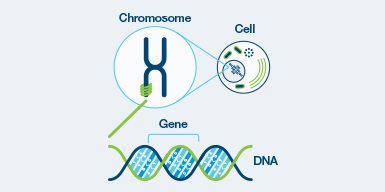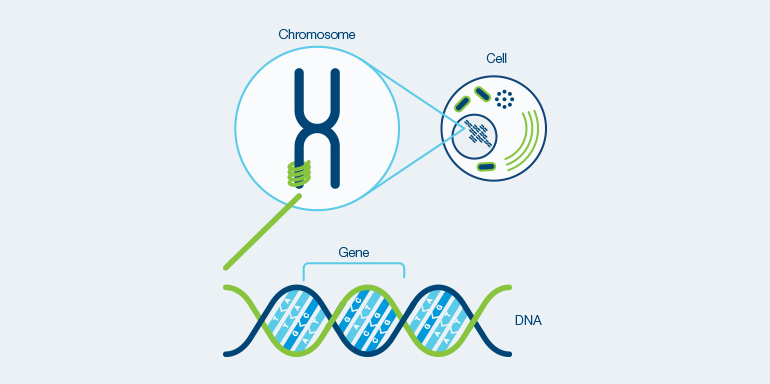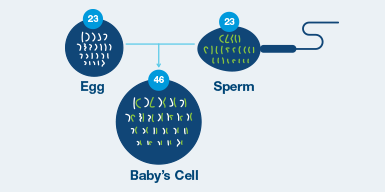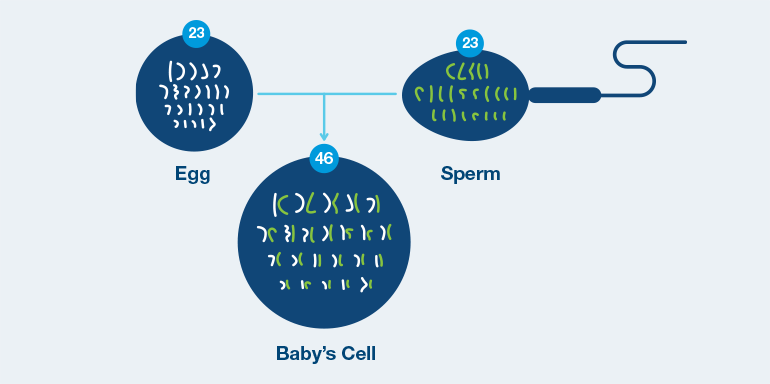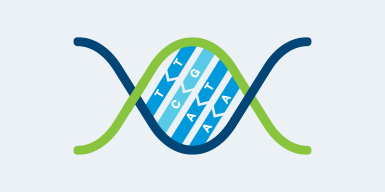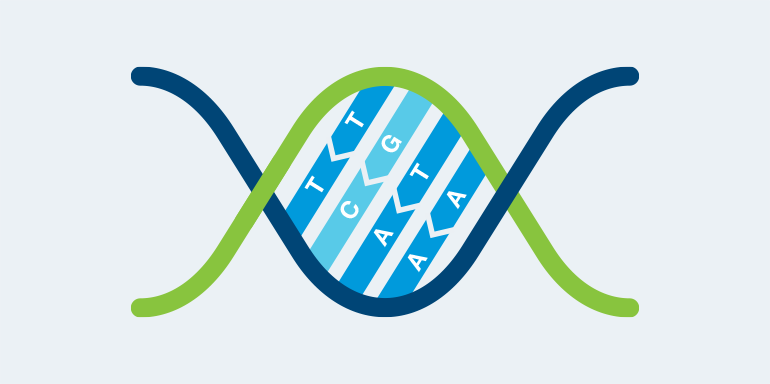What is Horizon™ carrier screening?
It is common for people to be carriers of at least one genetic condition.1 Most carriers are healthy with no family history, but they are at risk of passing on a genetic condition to their child. Horizon™ carrier screening is a genetic test performed before or during pregnancy that identifies if you carry a gene with a change, or variant, that can impact your child.

About Horizon™ Genetic Carrier Screening

Is carrier screening right for me?
Most people do not know they are a carrier for an inherited genetic condition until they have a child with the condition. Everyone can be a carrier of a genetic condition regardless of ethnicity, family background, or family history.
Genetic carrier screening can help you and your partner learn if you are at risk of passing on a genetic condition to your child. With Horizon™ carrier screening, you screen for one or more genetic conditions with one simple test. Before undergoing carrier screening, it may be helpful to learn more about genetics and inheritance of genetic conditions.
Genetics: The Basics
Cells are the basic building blocks of our body. Each of our cells contains our genetic information including thousands of genes that are packaged into chromosomes. Genes are the instructions that tell our bodies how to grow, develop, and function. People have 46 chromosomes that come in pairs. The first 22 pairs are numbered 1 through 22. The last pair, called the sex chromosomes, are different and are called X and Y. We usually get one copy of each chromosome from our mother and the other copy from our father.
Genes also come in pairs. We inherit one copy of each gene pair from our female parent and the other copy from our male parent. Genes are made of DNA, and DNA is made up of two strands that are wound together like a twisted ladder. DNA strands are made of an alphabet of four letters that are repeated in a certain sequence or order. These four letters A, T, G, and C are called bases. The bases in the DNA pair together, making “base pairs” where A is usually linked with T and G is usually linked with C.
Some conditions are caused when there is a change in the DNA. This happens when the bases in the DNA are changed. A change in a gene causes the gene to work improperly or not work at all. Genetic conditions happen when a gene or genes are changed.
Inheritance: Autosomal Recessive Conditions
There are different ways genetic conditions can be passed down or inherited in families. We carry two copies of most of our genes, one inherited from each of our biological parents. Some genetic conditions happen when only one gene in a pair has a change. These are called dominant genetic conditions. Horizon™ carrier screening does not screen for dominant genetic conditions. Horizon carrier screening tests for genetic conditions that happen when both copies of a gene pair have a change. These are called recessive genetic conditions. A carrier of a recessive genetic condition is someone who has a change in one of the genes in a pair.
A couple can have a child with a recessive condition when both the female and the male parent are carriers of the same condition. With each pregnancy, this couple has a 25% (1 in 4) chance of having an affected child.
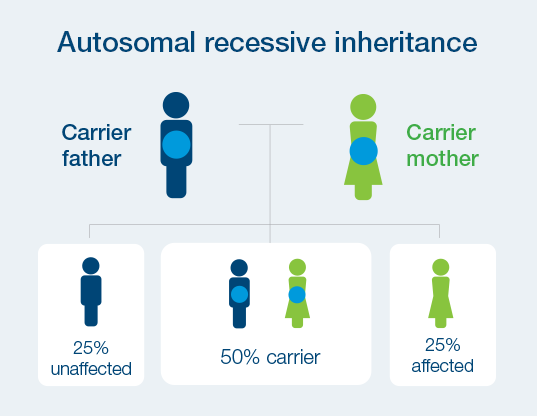
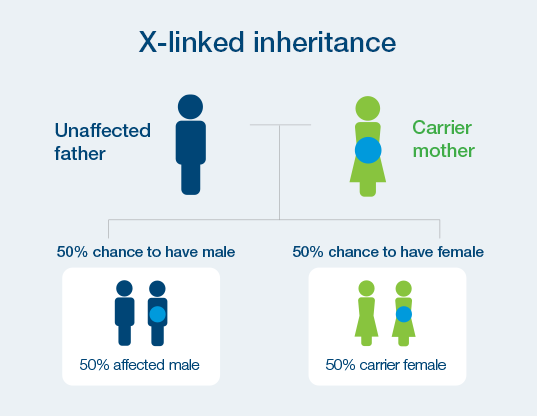
Inheritance: X-Linked Conditions
Male or female sex comes from the “sex chromosomes” X and Y. Females have two copies of the X chromosome. Males have one X chromosome and one Y chromosome. This means that females have two copies of each of the genes on the X chromosome and males only have one copy of these genes. Some genetic conditions are caused by changes in genes found on the X chromosome. These are called X-linked genetic conditions. Females can be carriers of X-linked conditions. Female carriers have one working copy and one non-working copy of an X-linked gene. Males are typically not carriers because they only have one X chromosome, so they are either healthy or affected.
For X-linked genetic conditions, only the female parent needs to be a carrier to be at risk of having an affected child. A carrier female parent has a 50% (1 in 2) chance of having an affected male child or carrier female child with each pregnancy.
What’s next if I am a carrier for a genetic condition?
Patients who are planning to conceive in the future
If you are a carrier for a specific recessive condition, your partner may want to have carrier screening for the condition ordered by a healthcare professional. Your doctor or a local genetic counselor can help decide which carrier screen is best for your partner. If your partner screens positive for the same condition that you are a carrier for, different reproductive options can be considered.
If you are a carrier for an X-linked condition, you may want to speak with your doctor or a genetic counselor about your Horizon test results. Partner screening is not often recommended as a next step if you are a carrier for an X-linked condition as only the mother needs to be a carrier for the condition to pass it along to her child.
For many couples, knowing their carrier status before their baby is conceived enables them to make informed reproductive decisions that can impact their child’s future. Couples at risk for having a baby with a recessive or an X-linked condition have the opportunity to consider:
- Natural pregnancy with or without prenatal diagnosis such as chorionic villus sampling (CVS) or amniocentesis
- Other reproductive options such as: preimplantation genetic testing (PGT) with in vitro fertilization (IVF) to test and then transfer embryos free of the disease that both partners carry, use of a sperm or egg donor, or adoption


Pregnant patients
If you are a carrier for a specific recessive condition, your partner may want to have carrier screening for the condition ordered by a healthcare professional. Your doctor or a local genetic counselor can help decide which carrier test is best for your partner.
If you are a carrier for an X-linked condition, partner screening is not often recommended as a next step as only the mother needs to be a carrier for the condition to pass it along to her child.
Carrier screening during pregnancy can have life-altering benefits: It can help couples decide on prenatal diagnostic testing such as chorionic villus sampling (CVS) or amniocentesis, and if necessary, help them prepare emotionally, medically, and financially for a baby with a genetic condition.
Is Horizon™ right for you?
We’re here to help you find out
References
1Bell et al. Sci Transl Med. 2011;3(65):65ra4

